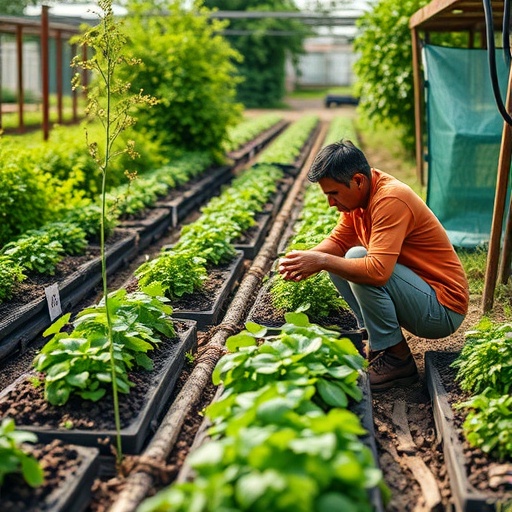In recent years, the conversation around organic farming has gained unprecedented momentum, particularly considering the escalating climate crisis and the continuous demand for sustainable agricultural practices. A pioneering study led by Gopalkrishnan and Taur sheds light on how different demographics perceive organic farming, particularly in the contrasting environments of urban and rural districts in India. This research not only provides valuable insights into consumer perceptions but also warns of the urgent need for effective sustainability messaging in tapping into the moral and ethical underpinnings of organic farming.
Central to the findings is the intriguing divergence in perceptions between urban and rural populations. Urban residents tend to associate organic farming with concepts of health, well-being, and premium quality. Their engagement with organic products is intricately linked to wellness narratives that dominate metropolitan media. This segment is influenced by a barrage of information from lifestyle bloggers, social media influencers, and an array of marketing campaigns that appeal to the societal values of health consciousness and environmentalism. Thus, urban consumers are driven by the desire for quality food that not only nourishes them but also aligns with a greener identity.
In contrast, rural communities reveal a more pragmatic approach to organic farming. Here, the motivations for engaging in organic practices aren’t merely based on prevailing health trends. Instead, it’s profoundly tied to economic survival and cultivation practices developed over generations. Farmers in rural settings regard organic farming as a method to enhance soil fertility, improve yields sustainably, and reduce the dependency on chemical fertilizers and pesticides. Their perspective is tightly interwoven with traditional agricultural knowledge, an understanding of local ecosystems, and a respectful relationship with the land that has supported them for generations.
The study brings forth a critical analysis of media messaging surrounding organic farming. Urban media channels often disseminate a narrative that romanticizes organic farming, presenting it as an elite lifestyle choice rather than a viable agricultural practice accessible to all. This portrayal can inadvertently alienate rural farmers who practice organic methods out of necessity rather than choice. The overlooked voices of these farmers can lead to misunderstandings about the realities of organic farming, crucially misrepresenting the benefits it can offer to both urban consumers and rural producers.
Moreover, the research underscores the importance of localized communication strategies when promoting organic farming. It becomes evident that a one-size-fits-all approach is ineffective. For urban audiences, media can focus on the health benefits, nutritional values, and environmental impact of organic products. Meanwhile, for rural communities, messaging ought to concentrate on the practical advantages of organic methods, community support, and the sustainability of agriculture practices that respect nature’s inherent cycles.
As agricultural scientists and policymakers navigate the complexities of promoting organic farming, understanding the narratives and values that resonate with different demographics is essential. The contrasting views of urban and rural communities highlight the need for targeted education and advocacy efforts that strengthen the organic sector and empower consumers and producers alike. This also emphasizes an urgent call for collaboration between agricultural experts, media practitioners, and local farmers to craft a shared narrative around organic practices—bridging the urban-rural divide in the discourse on sustainability.
Equally significant is the role of social media in shaping perceptions of organic farming. Urban consumers, particularly the younger generations, are increasingly turning to digital platforms for information, heavily influenced by online content creators who promote organic lifestyles. These influencers often spark interest in organic products, mobilizing their audiences to pursue healthier food choices. However, it is essential for credible information and authentic experiences from rural farmers to also find a place in these discussions, ensuring balanced representation.
Furthermore, the role of government and agriculture departments cannot be understated. Investing in local campaigns that harness storytelling and elevate farmers’ voices will not only create a deeper connection between the two demographics but also foster a sense of shared responsibility towards sustainable practices. The potential for collaborative farming initiatives that involve urban consumers supporting rural organic artisans could redefine the landscape of the organic market in India.
Ultimately, this research by Gopalkrishnan and Taur serves as a clarion call for coherence in the narratives surrounding organic farming. The path towards sustainability and regenerative agriculture requires that all stakeholders engage with a common language that emphasizes mutual respect and understanding. By aligning the values of health, sustainability, and community resilience, they can create a viable, lasting movement rooted in the principles of organic farming that benefits everyone.
The study not only illuminates the perceptions of organic farming but also sets the groundwork for future research. It encourages the exploration of policy frameworks that can promote organic farming practices globally, paving the way for sustainable futures. As we grapple with the pressing challenges posed by climate change, it is crucial that we acknowledge the intricate relationships we have with our food systems and the narratives we share about them.
Leveraging the insights gained from such studies will ensure a more inclusive approach towards sustainable agriculture, fostering environments where organic practices can thrive. In doing so, we will not only meet the demands of a growing populace but also advocate for a healthier planet that supports both current and future generations.
Subject of Research: Media perceptions of organic farming in urban and rural districts of India
Article Title: Media perceptions of organic farming and insights on sustainability messaging from an urban and rural district in India.
Article References:
Gopalkrishnan, S., Taur, A. Media perceptions of organic farming and insights on sustainability messaging from an urban and rural district in India.
Discov Sustain 6, 1158 (2025). https://doi.org/10.1007/s43621-025-02048-1
Image Credits: AI Generated
DOI: 10.1007/s43621-025-02048-1
Keywords: Organic farming, sustainability, urban-rural perceptions, media influence, agricultural practices.




